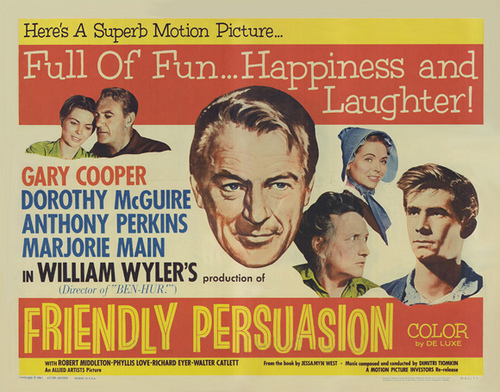In the course of writing a chapter surveying the portrayal of women in Civil War films (for a book called Blue And Gray In Black And White And Color) I’ve had the fascinating opportunity to watch two films I had never seen – one brilliant, one awful. Funny how that goes.
The brilliant one is so good I may add it to my film list for next year’s History of Screenwriting III (from 1950-1980) because of how well done it is and because it was written by Michael Wilson, one of the lesser known, blacklisted writers of the era though he also wrote The Bridge on the River Kwai, A Place in the Sun and Planet of the Apes (not a bad CV for a screenwriter).
In fact, the Wilson film that I loved didn’t even have his name – or the name of any screenwriter – or the Screenplay By credit on the opening credits at all. Because the studio wouldn’t put out a film by a blacklisted writer, director William Wyler wanted to put his brother’s name on the film – but the WGA said no. And Wilson didn’t want to use a pseudonym, so the film has no screenwriting credit. What it does have, that was built into the structure by the author of the novel on which it is based, Jessamyn West, is a wonderful chance for all the major and minor characters to do the most dramatic thing of all – to choose how to behave when the world’s activity doesn’t match your personal beliefs.
The film (and novel) is Friendly Persuasion, about an Indiana Quaker family in the path of Morgan’s Raiders during the Civil War. The mother is the local Quaker minister, her husband supports her to the best of his ability (though he’d like to buy an organ for their home because he doesn’t understand why music is wrong), and her son (played by Anthony Perkins in an Oscar nominated role) is the one who struggles with whether or not to pick up a guy and fight the Confederates as they have begun burning the barns on their friends’ local farms. It’s such a beautiful piece of drama because every character has to make a decision – and a tough one – about what they believe in – and then live with the consequences of that decision. While the opening of the film was a bit slow (as films from the 1950s tended to be – they gave you time to know the ‘world’ of the film that was about to be overturned by the events of the story) it all culminated beautifully.
On the other hand, for this research, I also watched a 1971 gothic horror film (also written by a formerly blacklisted writer, Albert Maltz) and also based on a novel (written by Thomas P. Cullinan) called The Beguiled. A lousier, more annoying piece of claptrap I have never watched. I wanted to turn it off several times but since I was studying how Civil War women were portrayed in films, I couldn’t, since the story is of a wounded Union soldier being cared for by the residents of a Southern girls boarding school. I get that gothic plus horror doesn’t equal true – and yet, horror is all the more horrific if it is based in some, small reality. This film is nothing more than a collection of sex kittens clamoring to lose their virginity to this representative of the enemy, the guy who was shooting at their loved ones yesterday is not my idea of the perfect man and yet these women fall into awful displays of coquettishness which I could never bring myself to believe.
I’ve read that Sofia Coppola is writing a remake. Part of me considers seeing it in hopes that she will find the reality that will make the story more palatable – but the other part of me never wants to wallow in that stupidity again. Despite how nice Clint Eastwood looked with his shirt off in those days, watching 12 year old girls try to have sex with him was far too icky for me. Then, again, perhaps that’s what classified the film as a horror film in the first place?
So if you want to take my advice, never rent The Beguiled but do make time in your viewing life for Friendly Persuasion.



